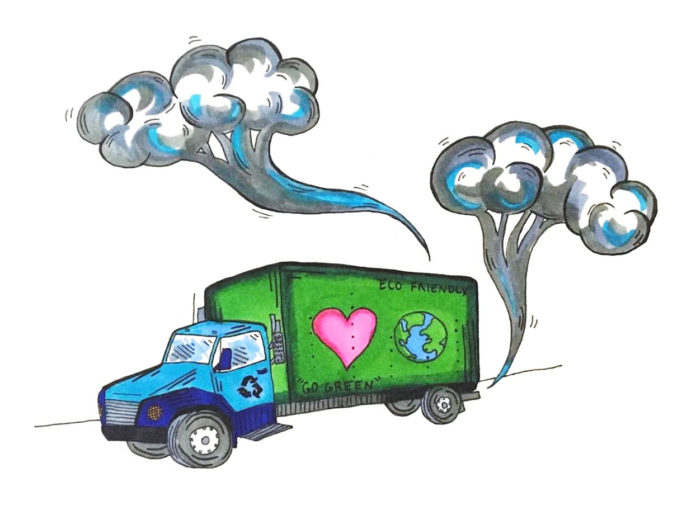In the wake of the World Climate March, it’s trendy to be eco-friendly. I bet you could name at least a couple of your friends at Oxy that wouldn’t be caught dead with a non-eco clamshell or a plastic water bottle. Consumers are increasingly choosing to buy green: more than half of online shoppers “are willing to pay more for products and services from companies that are committed to positive social and environmental impact,” according to a 2014 Nielson study. In light of changing customer habits, established companies are forced to adapt and address their environmental impact. Many companies use misleading advertisement campaigns to present themselves as environmental benefactors, while large corporations are actually responsible for 71 percent of all global emissions.
In order to follow an increasing demand for green products, companies are realizing that they need to take action to stay relevant — they might use a concept called “greenwashing.” According to WhatIs, greenwashing is “the practice of making an unsubstantiated or misleading claim about the environmental benefits of a product, service, technology or company practice.” Greenwashing originated in the ’80s when Chevron launched an environmental campaign called “People Do,” aimed at showcasing how much they cared about the environment all while they were violating the Clean Air Act and the Clean Water Act. More recently, Walmart paid $1 million to settle greenwashing claims in 2017 and Mobil Chemical added starch to their trash bags in order to falsely name their products as biodegradable.
Corporations can often fool consumers in the fashion and lifestyle sectors. Take Urban Outfitters as an example. Good On You, a blog focused on reviewing the environmental impact of clothing brands, rated Urban Outfitters “Not Good Enough,” in terms of their environmental impact. Still, Urban Outfitters sees it fit to have an environmental campaign. Included in their efforts to save the Earth is their “Urban Renewal Campaign,” an effort to sell “authentic” and “one-of-a-kind” vintage pieces. Though Urban Outfitters does not cite any reasons why the items in the campaign are better for the environment, they charge absurd prices for their clothing ($70 for a vintage Mickey Mouse sweater and $100 for paint-splattered pants). In another example, they cite remodeling an old Los Angeles theatre into an Urban Outfitters store as a part of their sustainability campaign as if fixing up an old building is going to lower the temperature of the Earth. Lush, famous for publicly criticizing animal cruelty and using “natural products,” uses parabens, notoriously bad for marine life and banned for use on infants in the EU. Similarly, Johnson & Johnson was recently implicated in a lawsuit that linked their baby powder to cancer due to dangerous chemicals — but has an information sheet on their website titled “The Green Graph: 8 Innovative Ways Johnson & Johnson Is Helping the Environment.” These companies are attempting to reconfigure their public image to seem environmentally conscious and to prevent a drop in sales.
Many firms have made great changes to their global impact. In their 2011 ad famously called “Don’t buy this jacket,” Patagonia urged consumers to abstain from buying products they did not need in order to reduce consumption. Unilever, a consumer goods company, now uses 100 percent renewable electrical energy across five continents. We should support companies like these, but it’s still important to stay mindful of the true extent to which companies are actually improving their practices. Half of all global emissions since 1988 have come from 25 corporations. Large corporations using unsustainable practices are by far the biggest threat to our environment.
Ultimately, the entire economic system needs restructuring in order for the current rate of global warming to stop. It is not enough for corporations to switch the color of their logo or revamp an old theatre in order to call themselves environmentally friendly. Companies need to change the entire system — it starts with corporations rethinking the modes of their production. It’s frustrating when consumers are urged to start biking or to eat less meat when the solution to climate change is in corporations’ hands. That’s not to say you can’t question your own consumption habits; for example, Reformation’s sustainability practices might be better for the Earth than other brands, but you don’t need $148 jeans to let people know that you care about the environment.
It is already troubling to navigate the global market as a consumer concerned with being conscientious, and reading this article may be anxiety-inducing at best. There are multiple ways you can make sure that companies are not greenwashing you: avoid companies who use vague language, tout small adjustments at the head office instead of a change in the production cycle or use buzzwords such as “biodegradable” or “compostable” without facts to back it up.
Oona Milliken is a sophomore Comparative Studies in Literature and Culture (CSLC) major. She can be reached at omilliken@oxy.edu.
![]()




































